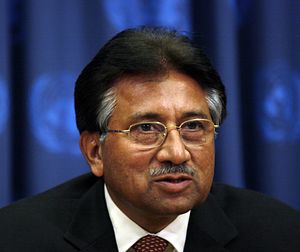The Saudi Foreign Minister Prince Saud al Faisal, during his recent visit to Islamabad, brushed aside suggestions that his country was planning a deal to provide a safe passage to Pakistan’s former military ruler General Pervez Musharraf. Prior to his visit, speculation was rife that Musharraf would flee the country under a covert deal between the civil and military leadership and the usual mediator, Riyadh. The Saudis exercise remarkable influence over Pakistan’s domestic politics. For religious reasons, Pakistanis, who view Saudi Arabia as the holy land, cannot say “no” to the oil-rich kingdom. For their part, the Saudis substantially finance Sunni Islamic schools across Pakistan in their proxy battle against the Shia-majority Iran.
Musharraf is currently in deep trouble. If the courts convict him of sedition over a state of emergency he imposed in 2007, the former military strongman could face the death sentence. Pakistan has never sent a former army chief to the gallows, although the army has staged at least three coups since the first in 1958 by General Ayub Khan.
The Saudis brokered a similar deal in 2000 to rescue the then deposed Prime Minister Nawaz Sharif (who returned to power in 2013) from the custody of the Musharraf regime. Sharif had been convicted by a military court to a life sentence but he was released through the intervention of the Saudis who subsequently hosted him for seven years.
Times have changed; now, it seems Sharif can return the favor. While he doesn’t owe any debts to Musharraf himself, Sharif will find it almost impossible to turn down a Saudi request to give the general a safe exit. Publicly, at least, the Saudi foreign minister said his country viewed Musharraf’s trial as Pakistan’s domestic affair and Saudi Arabia would not interfere in Pakistan’s internal politics.
Nonetheless, speculation about Musharraf’s exit from Pakistan on medical grounds have gained momentum in the aftermath of the Saudi visit. If Musharraf does manage to go abroad, few would believe that Riyadh did not play a role in his rescue.
Pakistan’s political history is full of dramas and clandestine deals, and in Musharraf’s case Pakistanis are convinced the powerful army is doing all it can to protect its former chief from public humiliation and, above all, conviction.
On January 2, Musharraf was supposed to appear before a court in Islamabad as a part of the ongoing trial against him. With no history of heart problems, Musharraf complained of heart pain and was soon taken to a military hospital. The admission provided Musharraf with a third opportunity to skip a court appearance. He had previously cited personal security concerns as another pretext for not showing up before the judges.
Meanwhile, with the apparent support of the Pakistan military, Musharraf has been provided numerous opportunities in recent weeks to generate public and military support through arranged television interviews. Defendants do not normally have that kind of media access. For Musharraf, it has been altogether a V.I.P. experience. One of his own admirers, Mubasher Lucman, a talk-show host, interviewed the former dictator on a widely watched private news channel. The interviewer, rather than the interviewee, continually reminded the audience how great a leader Musharraf had been during his term and how much the Pakistanis missed him.
Right-leaning Sharif is under pressure from the main opposition party, the Pakistan People’s Party, religious groups, civil society and sections of the media to put Musharraf on trial for charges other than the 2007 state of emergency. Nonetheless, a public backlash or street protests are unlikely, even if Musharraf is not put on trial. It has been six years since Musharraf’s exit, and public attention is now focused more on the policies of the current government than the performance of the Musharraf regime.
Sharif’s Pakistan Muslim League (P.M.L-Nawaz) won so many seats in the general elections of May 2013 that it can now run Pakistan for the next five years without the fear of losing its majority in the parliament. Still, Sharif’s thumping mandate will not necessarily give him the confidence to move against a former military chief, for two reasons.
First, punishing Musharraf by Sharif will be viewed as a vindictive measure against a man who had toppled his government and put him in jail. Some will see it as personal vendetta. Settling personal scores may not be Sharif’s intention, but he may not be able to avoid such accusations.
Second, executing Musharraf would certainly provoke the army and again pit it against a relatively weak democratic government. Members of Sharif’s inner circle are not naturally sympathetic to Musharraf. Yet they understand the heavy cost of confronting the military only months after taking power.
Yet convicting Musharraf would establish the supremacy of democratic rule in Pakistan and set a new precedence of applying the law of the land to everyone, irrespective of their past affiliations. It will not be easy to serve justice on Musharraf, making this a major gamble for the Sharif government and a test for democracy in Pakistan. If Musharraf does manage to flee the country without facing the courts, it will be a setback for both the rule of law and democracy, and Sharif will be seen as subservient to the army and its political interests.
Malik Siraj Akbar is a Washington-based South Asia analyst.

































